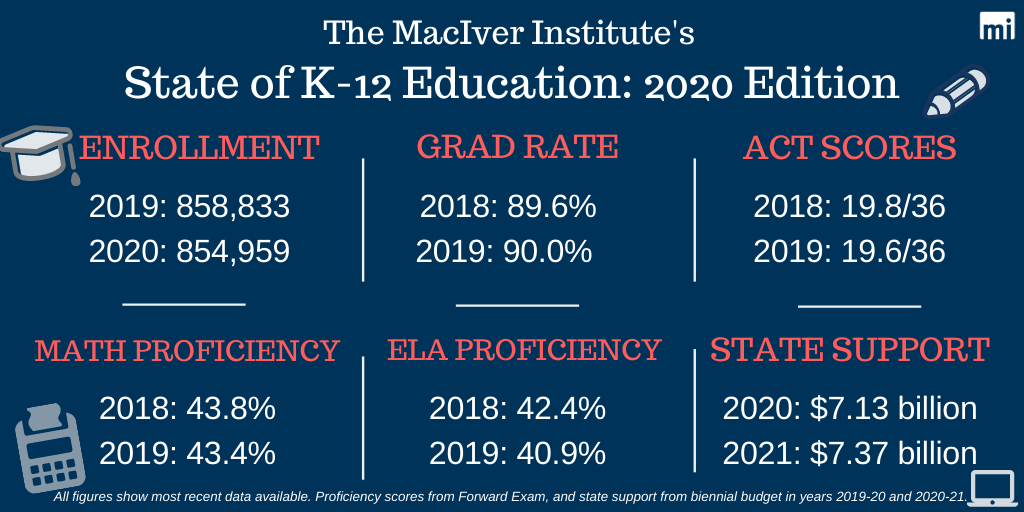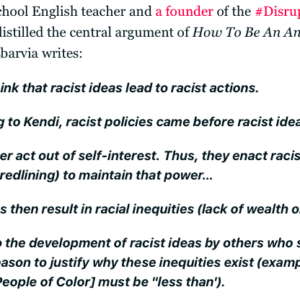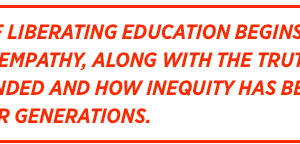
Questionable Curriculum: Critical Race Theory (Et Al) In Wisconsin – A Continuing Series
August 10, 2021
It is evident that Culturally Responsive Teaching — the current preferred term for Critical Race Theory — is not just randomly appearing in classrooms across the state, but is being pushed from the top down. Readers frequently ask the MacIver Institute, “How is CRT actually being passed onto teachers and children in the classroom?” There are many consulting firms and outside groups that provide DPI, schools, and teachers themselves with the resources they need to force CRT into the curriculum at the school district level or directly into the classroom. There is a concerted, organized, and vast campaign to push CRT onto our children. Here is the first of what will be many examples of the groups and organizations pushing CRT in Wisconsin.
In his presentation to educators, Dr. JuanCarlos Arauz said, “We all are encompassed in this thing called whiteness… We are in a system of oppression… The system of oppression operates in this manner: it is the greed of the few and the complicit of many, with the ignorance of most. That means that I don’t have to be racist to ensure that we continue to perpetuate the systemic racism and the prison industrial complex we have today.”
The Department of Public Instruction is connected to the Disproportionality Technical Assistance Network — known as “The Network.” According to their website, the Disproportionality Technical Assistance Network “works with PreK-12 educators, schools, districts and other community partners to reduce racial disproportionality in special education. Each member of our staff is committed to racial and social justice, striving to honor those who came before us while transforming current systems to ensure a hope-filled future for all.” The group is supposedly focused on special education initiatives, yet their website, resources, and events seem broadly focused on race and equity in all of K12 education.
The Network provides dozens of resources online for a variety of subjects including Culturally Responsive Teaching, Disproportionality and Equity, and Race, Racism, and Racial Bias. Out of the nine categories of resources found on the website, none appear to be focused only on special education.
Given that the page is produced by DPI, it must be assumed that the intended audience is educators. Among the available resources linked to from The Network’s website is the “Why Race Matters” page for Milwaukee Public Schools. This resource bank for MPS teachers includes articles like “10 Things Every White Teacher Should Know When Talking About Race.” Additional resources include “Guidelines For Culturally Responsive School Boards,” “Equity Starts Early: Addressing Racial Inequities in Child Care and Early Education Policy,” and “Equal Justice Society.”
In addition to the questionable resources that the Network provides, it also puts on events for teachers and staff. Past presentations include “The Essence of a Racial Equity Lens: Examining Race, Racism and Whiteness in Education,” “The Roots of Whiteness: Going Back To Go Forward,” and “Art as a Process to Decolonize Learning.”

It is important to remind readers here just how poorly our children are doing academically. According to the most recent data available, only 40% of students across the state are proficient in English Language Arts (ELA). Proficiency in math is only slightly higher at 43%. The achievement gap between students is also astounding. In the 2018-2019 school year, 13% of Black students were proficient in ELA, as opposed to 48% of White students. A similar trend is seen in math with only 12% of Black students proficient versus 52% of White students.
Recently, the Network sponsored a seminar on June 15, 2021, that was broken out into multiple sections, entitled “Grey Areas,” “Black Verve,” and “Cultural Resilience: Catapulting the Brilliance in Every Student.” Again, given that the Network focuses on Special Education, the target audience of these presentations was presumably Special Education teachers, however they were open for anyone to attend. It is worth noting that the core content of these three presentations focused on race, not Special Education.

The June 15 seminar opened with some housekeeping “agreements for courageous conversations.” One of these “agreements” is “what’s said here stays here.” It should be concerning to any parent or taxpayer that educators and other participants are told not to discuss with anyone else what was talked about during the presentation.
One of the presentations, Grey Areas, appears to redefine key terms so that the meaning of each word fits better in the Critical Race world they are trying to construct and helps advance their political agenda. We should clarify — they aren’t reading from the Merriam Webster Dictionary to share these definitions. These are their definitions, or current uses, of each of the terms. A great frustration for those of us trying to understand Critical Race Theory is the constantly changing names used for CRT, rhetoric, goal posts, and tactics used by Critical Race Theorists. Their presentation even includes a word that does not appear in the dictionary – allyship (see below).

A different presentation, Black Verve, was given by Dr. Decoteau Irby. The MacIver Institute has covered some of Irby’s radical work in the past when in 2018, he was the keynote speaker at DPI’s 34th Annual State Superintendent’s Conference on Special Education & Pupil Services. Rather than focus on Special Education or Pupil Services in his presentation, Irby spoke on White Supremacy. In his talk, Irby stated there are “devastating effects of living in and growing up in a white supremacy society, where you are conditioned over a lifetime to think that some people are inferior and that some people are superior.”
In this 2018 presentation, Irby discussed how, if you are white, you probably don’t have the “capacity” to understand just how racist you are and just how truly privileged you are. And your “white fragility” makes you feel quite uncomfortable any time you are made to come to terms with the truth of a white supremacy society.
The third presentation from the June seminar, “Cultural Resilience: Catapulting the Brilliance in Every Student” was put on by the consulting firm “e3 Education.” From their website, e3 Education “was founded in 2008 through a passion to end systemic inequity. We audaciously envision a future free of educational inequity. We envision a future where educators embrace the lived and learned experiences of each student, and value the strengths that each student brings. In this future, all students excel in obtaining the skills needed for their next steps in an ever-changing world.”
The presenter, Dr. JuanCarlos Arauz, discussed e3’s strategy for the most equitable way to assess students in the classroom — moving away from traditional standardized tests like the ACT, to something more subjective. His method includes three separate tools for educators: the Educational Strengths Assessment (ESAT), the Engagement Identification Tool (EIT), and the Equity Empowerment Tool (EET).
The student assessment element, the ESAT, “is an assessment that determines a person’s strengths based on their life experiences and translates these experiences into 5 competencies we call Cultural Resilience; Innovation, Adaptability, Critical Analysis, Cross-Cultural Communication and Teamwork.”
Soft skills like “communication” are important for students to learn, but we believe it is even more important that our children become proficient in core subjects.
This example illuminates one of the more important aspects of the Critical Race Theory debate and one that parents need to understand. CRT is no longer an esoteric academic exercise found only in a few lecture halls on campus. CRT is not about self-reflection and trying to be a better human being. CRT is a complete and radical overhaul of how we teach our children and what we teach our children.
Clearly, e3 believes teaching our children that 2+2=4 and testing our children to evaluate if they know the answer to this problem is unfair and racist. And it is a perfect illustration of how CRT has moved from theory to the practical – this idea, the elimination of standardized testing, is being discussed and advocated for at a gathering of actual educators, seemingly sponsored by our Department of Public Instruction.

This push to end the practice of evaluating students critically and declaring standardized testing unjust or systemic racism is already starting to appear in schools across the state. At the Wisconsin Public Education Network’s Summer Summit on August 2, 2021, the Sun Prairie School Board President, Dr. Steve Schroeder, shared that “Our school board a few months ago unanimously passed a resolution stating that we will move away from the almost exclusive use of standardized testing to assess student learning.”
During his presentation, Dr. JuanCarlos Arauz said, “We all are encompassed in this thing called whiteness… We are in a system of oppression… The system of oppression operates in this manner: it is the greed of the few and the complicit of many, with the ignorance of most. That means that I don’t have to be racist to ensure that we continue to perpetuate the systemic racism and the prison industrial complex we have today.”
Accompanying the presentations were a number of equally questionable handouts. One of these, entitled “White Culture” by Judith Katz describes that “it is important for us all to understand White Culture because many organizations have assumptions, values, and beliefs based on White Culture deeply embedded in their policies, practices, and styles for success.” Katz goes on to say that one must be cautious when discussing culture as it is “insidious.”
According to the handout, elements of White Culture that often appear in organizations include golfing, artwork, and the workforce employed in the cafeterias. Katz also argues that “benefit programs have long reflected the idealized white nuclear family.”
The MacIver Institute will continue to update this series and publish other entries as we investigate the numerous tips we have received from across the state.
Screenshots from The Network’s Resource page.
Questionable Curriculum: Critical Race Theory (Et Al) In Wisconsin – A Continuing Series
If you have additional tips or examples of CRT in the classroom that warrant investigation, please contact us at: info@maciverinstitute.com.




